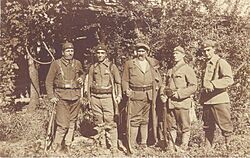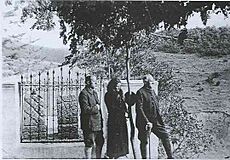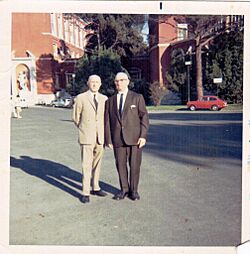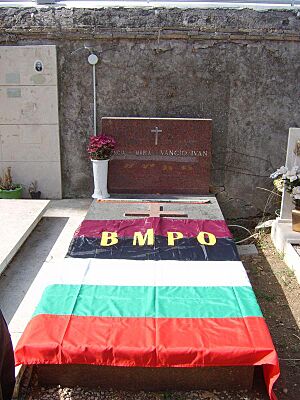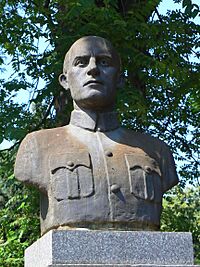Ivan Mihailov facts for kids
Quick facts for kids
Ivan Mihaylov
|
|
|---|---|
| Иван Михайлов | |
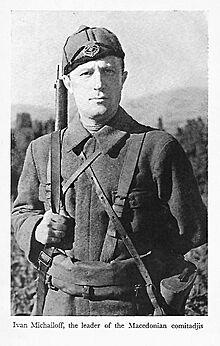 |
|
| President of the Internal Macedonian Revolutionary Organization | |
| In office 24 December 1924 – 1934 (together with Aleksandar Protogerov till 1928) |
|
| Preceded by | Todor Aleksandrov |
| Secretary General to the President of IMRO | |
| In office 1928 (alone) – 1934 |
|
| Personal details | |
| Born | 26 August 1896 Novo Selo, Ottoman Empire |
| Died | 5 September 1990 (aged 94) Rome, Italy |
| Education | Bulgarian Men's High School of Thessaloniki |
| Alma mater | Sofia University |
| Occupation | Revolutionary, politician |
| Profession | Lawyer |
| Signature | |
Ivan Mihaylov Gavrilov (Bulgarian: Иван Михайлов Гаврилов; Macedonian: Иван Михајлов Гаврилов; born August 26, 1896 – died September 5, 1990), also known as Vancho Mihaylov, was a Bulgarian revolutionary. He was the last leader of the Internal Macedonian Revolutionary Organization (IMRO) during the time between the two World Wars.
Under Mihaylov's leadership, IMRO became very strong against communism and focused on Bulgarian nationalism. This meant they fought against those who didn't support the Bulgarian idea in Macedonia, as well as left-wing groups within the Macedonian freedom movement. He also changed how the organization worked, moving from large group attacks to smaller, targeted actions. IMRO carried out many attacks against officials from Yugoslavia. One of the most famous was the killing of King Alexander I of Yugoslavia in 1934, done with the help of a Croatian group called Ustaše. Mihaylov also worked with powers like Mussolini's Italy and Hitler's Nazi Germany.
During World War II, IMRO had a lot of control over the Bulgarian part of Macedonia. They used this area to launch quick attacks against Yugoslavia and Greece. Towards the end of the war, Mihaylov tried to create an Independent Macedonia. However, he decided not to go through with it because Germany didn't offer enough military support, and he didn't want to start a civil war.
After World War II, during the Cold War, Mihaylov lived in Italy. The Macedonian Patriotic Organization (MPO) in the USA and Canada followed his guidance, working towards the old IMRO goal of an independent Macedonia. A CIA report from 1953 even called the MPO "the US branch of the IMRO" and said it raised money for Mihaylov's activities. Just before he died in 1990, as communism was ending, he continued to say, "I am Bulgarian from Macedonia" and advised young people in Macedonia to remember their thousand-year Bulgarian history. In Communist Yugoslavia, Mihaylov was seen as a traitor and a "fascist." He is still viewed this way in what is now North Macedonia, where IMRO is considered a controversial Bulgarian organization because its ideas conflict with the Yugoslav Macedonian historical story. In Communist Bulgaria, he was first seen as a Nazi helper but was later partly recognized as supporting the Bulgarian view that a widespread Macedonian national identity didn't exist before World War II. Today, he is fully recognized there.
Mihaylov wrote four books of his memories and many articles. These include "Macedonia - Switzerland in the Balkans" and "Stalin and the Macedonian Question," which describe the Macedonian fight for freedom.
Contents
Biography: Ivan Mihaylov's Life Story
Early Years: Growing Up and Education
Ivan Mihaylov was born on August 26, 1896, in Novo Selo, which is now part of Štip, North Macedonia. At that time, it was part of the Ottoman Empire. He went to the Bulgarian Men's High School of Thessaloniki in Thessaloniki. This school closed during the Second Balkan War in 1913. He then continued his studies at a Serbian school in Skopje. He was offered a scholarship to study at a European university but turned it down.
During World War I, he joined the Bulgarian Army. After the war, Mihaylov moved to Sofia, Bulgaria, where he studied law at Sofia University. Around this time, he became the personal secretary to Todor Aleksandrov, who was the leader of IMRO.
Leader of IMRO: Taking Charge
On August 31, 1924, Todor Aleksandrov was killed. Soon after, Ivan Mihaylov took control of IMRO and became a very powerful person in Bulgarian politics. IMRO quickly blamed communists for Aleksandrov's death, though some believed Mihaylov might have been involved. These events caused disagreements within the organization, leading to several important killings.
During the time between the World Wars, IMRO, under Mihaylov, acted against some former members of its left-wing group. Mihaylov's younger IMRO members disagreed with the older members. The older group preferred sending armed groups into Yugoslavia and Greece. The younger group, led by Mihaylov, wanted more flexible methods, like smaller groups carrying out targeted killings of public figures. This disagreement grew into a fight for leadership. In 1928, Mihaylov ordered the killing of a rival leader, General Aleksandar Protogerov. This started a conflict between "Mihaylovists" and "Protogerovists." The Protogerovists, who were fewer and not as well-equipped, soon allied with Yugoslavia and some Bulgarian military groups. This period saw an increase in IMRO's armed actions in Aegean Macedonia and especially in Vardar Macedonia. Between 1922 and 1930, there were 63 attacks on bridges, warehouses, and military targets. Thousands of Serbian officials and their helpers were killed.
IMRO had almost complete control over Pirin Macedonia and acted like a "state within a state." They used this area to launch quick attacks against Yugoslavia, with unofficial support from Bulgaria and later Fascist Italy. IMRO also formed close ties with the Croatian Ustaše movement. Many killings were carried out by IMRO members in different countries, mostly in Yugoslavia. The most well-known was the killing of King Alexander I of Yugoslavia and the French Foreign Minister Louis Barthou in Marseille in 1934. This was done with Ante Pavelić.
IMRO's constant internal killings and assassinations abroad led some in the Bulgarian military to take action. After the Bulgarian coup d'état of 1934, they tried to stop the organization. In 1934, Mihaylov fled to Turkey. He told his supporters not to fight the Bulgarian army and to give up their weapons peacefully. This helped avoid a civil war or foreign invasion. Many people in Pirin Macedonia were happy about this, as they felt relieved from IMRO's control. Mihaylov received nine life sentences and three death sentences in Bulgaria.
Even though IMRO's main goal was to create an independent Macedonian state, some Bulgarian governments allowed it. This was because IMRO's goal was to free Macedonia from Greek and Yugoslav control, which Bulgaria considered Bulgarian land. Because of this, IMRO had a large network in Pirin Macedonia and other parts of Bulgaria. This network helped fund the organization and provided a base for attacks into Yugoslavia and Greece. While Mihaylov was in exile, IMRO continued to exist through members in various countries but was not very active in Macedonia, except for short periods during World War II.
1934 – 1944: During World War II
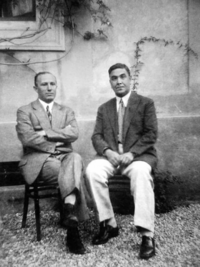
After 1934, Mihaylov lived in Turkey, Poland, and Hungary. He finally settled in Zagreb, the capital of Croatia, which was then part of the Independent State of Croatia, a state controlled by fascists. In 1941, during World War II, most of Vardar Macedonia and half of Greek Macedonia were taken over by Bulgaria. Mihaylov chose not to return to the Bulgarian-controlled part of Macedonia and stayed in Croatia until the war ended.
In 1943, with his help, some armed groups called Ohrana were formed. These groups included Bulgarian-speaking Slavs in Greek Macedonia, which was occupied by Italy and Germany. It seemed Mihaylov had bigger plans to create a Macedonian state controlled by Germany. It was also expected that IMRO volunteers would form the main part of the armed forces of a future Independent Macedonia. They would also help with administration and education in certain districts.
Refusal to Create a German-Controlled State
In August 1943, Ivan Mihaylov secretly traveled from Zagreb to Germany. He met with Hitler and other top German leaders. From the limited German information available, it seems Mihaylov was allowed to create three battalions of volunteers with German weapons. These battalions would be under the command of Heinrich Himmler, a high-ranking Nazi official. Talks also took place in Sofia between German SS officials and IMRO leaders.
Even though these talks were secret, the Bulgarian government found out some information. On September 2, 1944, Bulgaria ordered its troops to leave Macedonia. German messages show that on September 3, 1944, Mihaylov was flown from Zagreb to Sofia. Another German message on September 5 said Hitler again ordered the creation of a German-controlled state in Macedonia. Mihaylov was taken to Skopje on the evening of September 5 "to see what can be saved." Another message with Hitler's order came on September 6.
However, on September 6, Mihaylov refused to lead an independent "puppet state." He said he couldn't get enough local support. German diplomats in Skopje reported to Berlin that the plan to create such a state had failed. On September 8, 1944, Germany closed its office in Skopje, and Mihaylov, his wife, and staff from the German office left Skopje. Despite this, on the same day, some right-wing IMRO nationalists declared independence.
During the Cold War: Life in Exile
In 1944, Mihaylov had to flee again, this time to Italy. The Bulgarian communist leader Georgi Dimitrov ordered Mihaylov's assassination. The new governments in Bulgaria, Yugoslavia, and Greece saw his followers as fascists and traitors and persecuted them. After World War II, the ruling Bulgarian Communists declared the people in Bulgarian Pirin Macedonia to be ethnic Macedonians. Teachers from Yugoslavia were brought in to teach them the newly created Macedonian language. IMRO's organizations in Bulgaria were completely destroyed. Former IMRO members were hunted by the communist police, and many were imprisoned, punished, exiled, or killed.
At the same time, former "Mihaylovists" were also persecuted by the authorities in Belgrade (Yugoslavia). They were accused of working with the Bulgarian occupation, being Bulgarian nationalists, and being against communism and Yugoslavia. Josip Broz Tito and Georgi Dimitrov worked on a plan to combine Bulgaria and Yugoslavia into a Balkan Federative Republic under communist control. These plans changed after the Tito–Stalin split in June 1948, when Bulgaria, following the Soviet Union, took a stand against Yugoslavia. After World War II, many former "Ohranists" were found guilty of war crimes as collaborators. Also, after the Greek Civil War, many of these people were forced to leave Greece and were tortured for being Bulgarians.
Over time, Ivan Mihaylov became recognized as a political figure and writer of the ideas behind the Bulgarian national liberation movement in Macedonia. This led to a close political alliance between Ivan Mihaylov and the Macedonian Patriotic Organization (MPO) in the United States, Canada, and Australia in the late 1940s. Mihaylov became the MPO's leader in terms of ideas, and the MPO provided people and money for the political struggle. With help from the United Nations and other groups, the human rights of Bulgarians punished by Tito in Yugoslavia were protected.
To create a basis for the Bulgarian emigrant movement and record history, Ivan Mihaylov started writing his memoirs from the 1950s to the 1970s. The MPO's Central Committee published these in four large books. These works show important Bulgarian national interests from the 1950s to the 1970s. After Bulgaria changed its policy towards the Macedonian question in the late 1950s, Mihaylov was largely forgotten. However, in September 1989, a journalist from Skopje, Boris Vishinsky, decided to try and interview Mihaylov. He shared his hope for an interview on Radio Vatican, which contacted Anton Popov, a journalist there. Popov was one of the people abroad whom Ivan Mihaylov trusted most. Sensing that Yugoslavia was about to break apart, Mihaylov agreed to the interview but only provided written answers.
It was a big surprise for many in Bulgaria when, in 1990, as the Cold War ended, the popular TV host Kevork Kevorkyan contacted Mihaylov. Many people thought Mihaylov had died long ago. Kevorkyan recorded a long interview with him. After many years of official propaganda, many still thought of him as an "enemy of the people." This was Mihaylov's last interview. He died in Rome on September 5, 1990.
Legacy: Remembering Ivan Mihaylov
Even though the Internal Macedonian Revolutionary Organization (IMRO) was no longer active, Mihaylov remained a leader of the Macedonian Liberation Movement. He was supported by the Macedonian Patriotic Organization in the US and Canada. He wrote four books of his memories and regularly wrote articles for The Macedonian Tribune, which is the oldest continuously published Macedonian emigrant newspaper. Until the end of his life, Mihaylov remained interested in the future of the Macedonians (whom he believed were ethnically Bulgarian). He was dedicated to the idea of an independent Macedonian state.
In Bulgaria, Mihaylov is seen as an important revolutionary. He is considered one of the freedom fighters who continued the struggle for political independence in the Bulgarian-populated parts of Macedonia after most of the region was divided between Serbia and Greece after World War I. His memory is honored, and streets and schools throughout Bulgaria are named after him.
In North Macedonia, Ivan Mihaylov is seen as a controversial pro-Bulgarian revolutionary. The Constitutional court of North Macedonia banned the Radko Association, a pro-Bulgarian organization named after Ivan Mihaylov, calling it separatist.
Radko Knoll on Rugged Island in Antarctica is named after Ivan "Radko" Mihaylov.
On December 20, 2014, the Government of Macedonia, led by Prime Minister Nikola Gruevski, opened a memorial home in Novo Selo, Štip. This home honors leaders of the historical VMRO, including Ivan Mihaylov.
Mihaylov's Views on the Macedonian Question
There are different political opinions about Mihaylov's actions in Bulgaria. However, experts agree that he strongly believed the Slav-speaking people in Macedonia were Bulgarian. He supported the idea of an independent United Macedonia as a multiethnic state, like "Switzerland in the Balkans," but with a strong Bulgarian presence.
According to his personal secretary, Vida Boeva, he constantly sent petitions, protest letters, and memoirs to the UN. He used the name of the Macedonian Patriotic Organization to argue that the Macedonian Republic was a colony of Serbia, just under a different name, and not a true Macedonian nation. He also stated that Macedonia is Bulgarian and that the Slavs in Macedonia are Bulgarian. He believed that all the people who held power in Macedonia were either "serbophiles" (pro-Serbian) or "grecophiles" (pro-Greek). He thought that Macedonians were part of the Bulgarian nation and that the founders of IMRO accepted the idea of a San Stefano Bulgaria. According to Macedonian historian Ivan Katardžiev, Mihaylov viewed the term "Macedonian" as a general regional term. He believed it included different ethnic groups like Bulgarians, Aromanians, and Albanians, but not a separate ethnic Macedonian group. He saw his IMRO as "a purely Bulgarian affair" and himself as "a terrorist and a supporter of Bulgarian revenge."
It seems that during the Cold War, Mihaylov changed some of his views on an independent Macedonia. In 1979 in Rome, he claimed that SR Macedonia was just a Yugoslav satellite. He even said that if it became completely independent, it would be bad for Bulgaria. In this way, he believed its natural place would be to unite with Bulgaria.
 | May Edward Chinn |
 | Rebecca Cole |
 | Alexa Canady |
 | Dorothy Lavinia Brown |


